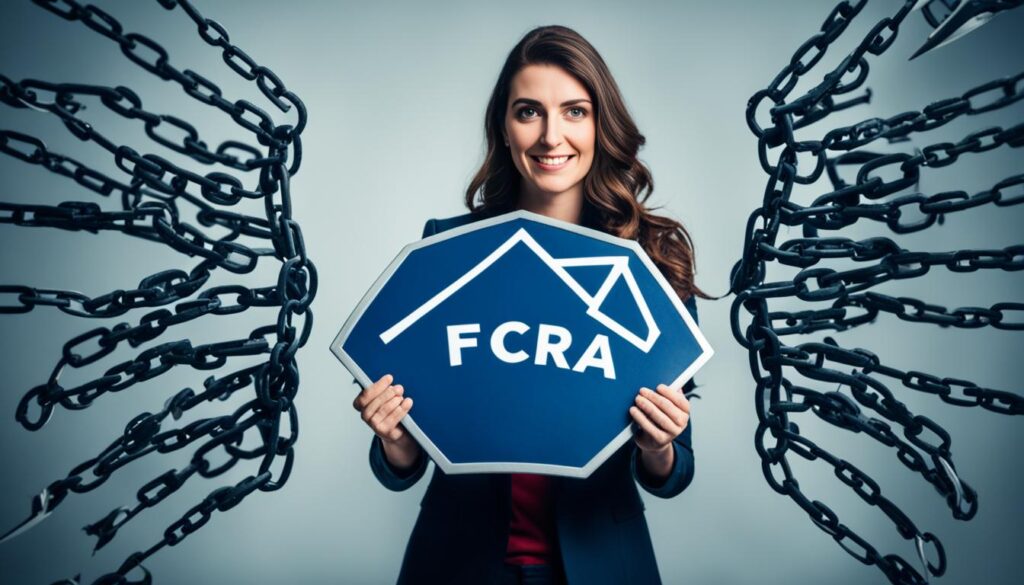Credit report errors can ruin your finances. They may lower your credit score, making loans harder to get. A lawyer can help fix these issues and protect your future.
Credit inaccuracies aren’t minor problems. They can lead to loan denials and higher insurance rates. They might even cost you job opportunities.
Knowing how to dispute these errors is vital for your financial health.
Legal help offers a strong approach to these issues. Lawyers know credit reporting laws inside out. They can guide you through correcting errors and protecting your rights.
Key Takeaways
- Credit report errors can significantly impact your financial health
- Legal assistance is valuable in disputing credit inaccuracies
- Lawyer credit disputes can effectively resolve persistent errors
- Understanding your rights is crucial when dealing with credit report issues
- Professional legal help can navigate complex credit reporting laws
Understanding Credit Report Errors and Their Impact
Credit report errors can ruin your financial life. These mistakes can lower your credit score and hinder your ability to restore credit score. Let’s explore these errors and their effects.
Common Types of Credit Report Errors
Credit report errors come in various forms. Some common issues include:
- Incorrect personal information
- Accounts falsely reported as late or delinquent
- Closed accounts shown as open
- Duplicate accounts
- Wrong credit limits
Impact on Your Credit Score
Errors can greatly affect your credit score. A single mistake might drop your score by dozens of points. This can result in higher loan interest rates or credit denials.
Quick action to dispute errors with credit bureaus is vital. It helps fix these issues promptly.
Long-term Consequences of Uncorrected Errors
Ignoring errors can lead to serious long-term effects:
| Consequence | Impact |
|---|---|
| Higher loan costs | Pay thousands more in interest |
| Rental application rejections | Struggle to find housing |
| Job offer withdrawals | Miss career opportunities |
| Insurance premium hikes | Pay more for coverage |
Credit report errors can hold you back. Check your credit report often. Act quickly on disputes to keep your finances healthy.
The Fair Credit Reporting Act: Your Rights and Protections
The Fair Credit Reporting Act (FCRA) is a key U.S. consumer protection law. It guards your credit info rights and lets you challenge wrong credit report details.

The FCRA gives you free yearly credit reports from major credit bureaus. This helps you check your credit info often. You can spot and dispute errors with credit bureaus and info providers.
The Act sets strict timelines for looking into disputes. Credit bureaus must finish checks within 30 days. If an error is found, it must be fixed quickly on all reports.
“The Fair Credit Reporting Act empowers consumers to take control of their credit information and challenge inaccuracies that could harm their financial well-being.”
The FCRA also limits who can see your credit report. Employers, lenders, and landlords need your okay first. This keeps your money info safe from wrong use.
Knowing your FCRA rights helps you manage your credit profile well. You can keep it correct and fair. This knowledge is key for your money health.
Steps to Identify Credit Report Inaccuracies
Spotting credit report errors is vital for your financial health. Follow these steps to find and dispute credit inaccuracies effectively. Your financial future depends on it.
Obtaining Your Free Credit Reports
Get your free yearly credit reports from Equifax, Experian, and TransUnion. Visit AnnualCreditReport.com to request them. Check each report carefully for different information.
Reviewing Your Credit Reports for Errors
Look for mistakes in your reports. Check personal info, unknown accounts, and payment histories. Pay attention to dates, balances, and account statuses.
Documenting Discrepancies and Gathering Evidence
Note any errors you find carefully. List inaccuracies and collect proof like bank statements and payment receipts. This evidence is crucial when disputing errors with credit bureaus.
- Mark errors on copies of your credit reports
- Collect relevant financial documents
- Write detailed explanations for each discrepancy
These steps prepare you to challenge inaccuracies and boost your credit score. Quick action on credit report errors prevents long-term financial problems.
DIY Credit Dispute Process: Pros and Cons
Disputing credit bureaus on your own can be challenging. Many people try this to remove negative items from their credit reports. Let’s look at the good and bad sides of this approach.

The DIY method gives you full control over the dispute process. You can talk directly to credit bureaus about your concerns. It’s also cheaper since you don’t pay for professional help.
However, credit repair can be complex and overwhelming. Without expert knowledge, you might miss important details or make mistakes. The process can also take a lot of time and effort.
“Handling credit disputes yourself can be empowering, but it’s important to weigh the pros and cons before diving in.”
Think about these things before deciding to dispute credit bureaus yourself:
- Your understanding of credit laws and regulations
- The complexity of your credit issues
- The time you can dedicate to the process
- Your comfort level in dealing with financial matters
| DIY Approach | Professional Help |
|---|---|
| Cost-effective | Expertise and experience |
| Full control | Time-saving |
| Personal learning experience | Higher success rate |
| Potential for mistakes | Legal protection |
If you’re not sure about doing it alone, consider getting help. A credit repair professional can offer valuable insights. They might increase your chances of removing negative items from your credit report.
When to Seek Legal Assistance for Credit Disputes
Navigating credit disputes can be challenging. Sometimes, professional help is necessary. Let’s explore when hiring a lawyer credit dispute expert is beneficial.
Complex Cases Requiring Expert Knowledge
Some credit issues resemble intricate puzzles. These cases often require a credit repair attorney’s expertise. They possess in-depth knowledge of relevant laws.
Lawyers can identify crucial details you might overlook. Their expertise can be invaluable in resolving complex credit disputes.
Persistent Errors After Multiple Disputes
You’ve tried fixing errors on your credit report. Despite your efforts, the mistakes remain. This situation calls for legal intervention.
Lawyers have effective tools to make credit bureaus take notice. They can help resolve persistent errors on your credit report.
Dealing with Identity Theft or Fraud
Identity theft can severely damage your credit. It’s a frightening experience that’s difficult to handle alone. A credit dispute lawyer can help clean up the mess.
They know how to prove you’re not responsible for fraudulent accounts or charges. Their expertise is crucial in resolving identity theft issues.
| Situation | DIY Approach | Legal Assistance |
|---|---|---|
| Simple Error | Often effective | May not be needed |
| Complex Case | Can be overwhelming | Highly recommended |
| Persistent Errors | May hit roadblocks | Can break through barriers |
| Identity Theft | Challenging to manage | Expertise is crucial |
Quick fixes aren’t always the best solution for credit issues. Working with a skilled lawyer can be a wise investment. It may be the key to securing your financial future.
Lawyer Credit Dispute: How Attorneys Can Help

A lawyer credit dispute can be your strongest ally against credit report errors. These attorneys protect your rights under the Fair Credit Reporting Act. Their expertise ensures your case is handled professionally and effectively.
Credit repair attorneys offer crucial services to help you. They analyze your credit reports thoroughly and spot inaccuracies. They also draft dispute letters and negotiate with creditors on your behalf.
If needed, these lawyers can represent you in court. Their deep understanding of credit laws allows them to identify subtle violations.
- In-depth analysis of your credit reports
- Identification of inaccuracies and violations
- Drafting dispute letters to credit bureaus
- Negotiation with creditors on your behalf
- Representation in court if necessary
Legal expertise often leads to faster dispute resolutions. It can also result in more favorable outcomes for you.
“Having a lawyer by your side can make all the difference in resolving credit report inaccuracies.”
Lawyer involvement adds weight to your case. Credit bureaus and creditors take disputes more seriously when they come from attorneys. This can speed up corrections and potentially improve settlements for error-caused damages.
Credit specialists can guide you through the process. However, only attorneys can provide legal advice and representation. For persistent errors or complex issues, consider hiring a credit repair attorney.
Choosing the Right Credit Repair Attorney
Selecting a credit repair attorney is crucial for resolving credit disputes. The right lawyer can greatly impact your case outcome. Choose wisely to increase your chances of success.
Qualifications to Look For
Focus on the attorney’s experience and track record in consumer credit law. Look for lawyers with a history of successful cases. Check their credentials, including bar associations and professional affiliations.
Questions to Ask During Consultations
Ask about their approach to credit disputes during your initial meeting. Inquire about their success rate and communication with credit bureaus. Request references from past clients to gauge their performance.
- How many credit repair cases have you handled?
- What’s your strategy for my specific situation?
- How long do you expect my case to take?
Understanding Fee Structures
Credit repair attorneys may charge differently. Some work on contingency, while others charge hourly rates or flat fees. Discuss payment options upfront to avoid surprises.
Consider the value an experienced attorney can bring to your case. The cheapest option isn’t always the best choice for your needs.
“A skilled credit repair attorney can navigate complex legal waters, potentially saving you time and money in the long run.”
Carefully evaluate these factors when choosing a credit repair attorney. Find someone who fits your needs and budget. This approach increases your chances of a favorable outcome in your credit dispute.
The Legal Process of Disputing Credit Inaccuracies
The Fair Credit Reporting Act allows you to challenge errors on your credit report. This legal process begins by filing formal disputes with credit bureaus. You’ll need to write a detailed dispute letter to start.
Include your personal info, account details, and a clear explanation of the error. Add supporting documents to make your case stronger. Credit bureaus have 30 days to look into your claim.
They’ll contact the information provider, usually a creditor or lender. If the provider can’t verify the info, the bureau must fix or remove it. If bureau disputes don’t solve the issue, you have other options.
- File a complaint with the Consumer Financial Protection Bureau
- Seek legal representation for more complex cases
- Consider filing a lawsuit under the Fair Credit Reporting Act
Keep detailed records of all communications during this process. Follow up on your disputes regularly. With patience and effort, you can protect your credit score and financial future.
Debt Validation Letters: A Powerful Legal Tool
Debt validation letters help verify debts and protect your rights. They’re essential for managing credit and handling debt collectors. These letters can be a game-changer in your financial journey.
Purpose and Benefits of Debt Validation Letters
A debt validation letter formally requests proof of a debt’s validity. It can help remove negative items from your credit report if the debt isn’t legitimate. These letters also pause collection efforts, giving you time to review.
How to Draft an Effective Debt Validation Letter
When writing a debt validation letter, include:
- Your personal information
- The debt collector’s details
- A clear request for debt validation
- A statement of your rights under the Fair Debt Collection Practices Act
Legal Requirements for Creditors’ Responses
Creditors must respond to debt validation letters within 30 days. Their response should include:
| Required Information | Purpose |
|---|---|
| Original creditor’s name | Verify debt origin |
| Amount owed | Confirm debt amount |
| Account number | Identify specific debt |
| Date of last payment | Determine debt age |
Debt validation letters ensure accuracy and protect your rights under consumer protection laws. They help maintain a healthy credit profile and avoid paying for incorrect debts.
Use this tool wisely to take control of your financial future. It’s a powerful ally in your quest for financial stability.
Consumer Protection Laws Beyond FCRA
The Fair Credit Reporting Act isn’t your only defense against credit disputes. Other laws work with FCRA to protect your financial rights. These laws help you fight credit inaccuracies and unfair practices.
The Fair Debt Collection Practices Act limits how debt collectors can contact you. It’s useful if collection agencies are harassing you. The Truth in Lending Act ensures clear information about credit terms and costs.
The Electronic Fund Transfer Act safeguards your rights in electronic banking. It helps dispute unauthorized transfers on your credit report. The Equal Credit Opportunity Act bans lending discrimination based on personal characteristics.
Knowing these laws alongside FCRA can help you tackle credit report errors. They create a framework for fair credit reporting. Understanding these laws is your best defense against unfair practices.

